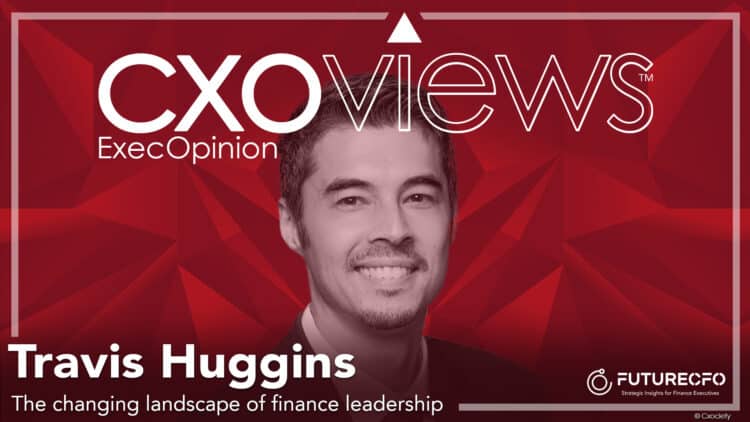As with anything in the world, the finance leadership landscape has been evolving especially following the COVID-19 pandemic which brought about drastic changes into the market.
The finance function has been handling shifts here and there and chief finance officers have time and again strove to find the balance as they now work as strategic advisors to the C-suite team to bring in specific strategies for innovation.
The evolution of the role of CFOs has accelerated after the pandemic and incumbents are having to adapt quickly, otherwise they'll face being left behind. This means that every decision made in the board room is crucial to the overall results and endpoint of each and every plan and initiative, hence finance leaders should have a clear view of the road they have to take.
For Travis Huggins, DBA, FCA, chief operating officer at Knight Frank Greater China, finance leaders are no longer just looking at financial matters nowadays, as they now need to oversee non-financial strategic matters, environmental, social, and governance (ESG), the increasing regulatory requirements, and systems and software, including artificial intelligence.
The evolution
Huggins says the key traits of a financial leader and the concept of leadership have both evolved amid the changing landscape.
He observes that each generation of staff now requires different leadership styles to bring out the best in them, and that strong soft skills and emotional intelligence (EQ) will continue to take precedence over raw IQ, financial and systems knowledge due to increasing automation and the democratisation of information.
Additionally, Huggins notes that stronger stakeholder engagement and management in matrixed organisations is invaluable.
Strategy for success
Part of the financial leadership role is to drive innovation in the business through strategies for success.
This might include external presence and taking a role in the industry, and CFOs, as a core stakeholder, should be seeking to shape the industry they operate in by taking an active role.
Huggins says the strategy for success is multi-pronged: a stronger stakeholder engagement and management, which involves the management of one's contribution and deliverables vis-à-vis c-suite counterparts; bringing value beyond the CFO's role, as a CFO must assist with business development and bring in valuable clients; and building a more diverse background and skillset.
For the Knight Frank Greater China COO, the latter perhaps takes a longer time to achieve. He explains, "Having local language abilities in Asian markets may help you stand out from peers or learning about GenAI (a hot topic!) via courses to understand the application in your company."
Paths
In the road to becoming a finance leader, Huggins says there are three points that are somewhat interlinked:
- Initially, mentors are invaluable within and outside the company to give context, new angles and fresh ideas on how to navigate one's career path.
- In the role, alignment with the manager and the 2-up manager (i.e. manager’s manager) is important.
- Thinking of the role and tasks as if they were your manager or 2-up manager allows one to frame their decisions and actions more strategically.
Navigating career transitions
As one navigates through the changing landscape of finance leadership, it is important they understand the field they are moving in.
Huggins advises those aspiring to transition towards the finance leadership role, saying " it is easier to move within a similar industry to a new role such as a Finance Director (FD) to CFO or COO, or a CFO to CEO."
He explains that a complete change in career may require additional study or taking a step or two back from one's current role in terms of seniority and remuneration, which is often difficult for individuals to fathom, particularly if they have been on the same pathway for 10 years or more.
"If you are averse to taking too much of a step backwards but want a career change, you should look to sideways moves first to build skills in the adjacent field of interest before trying to land a position in that field," Huggins suggests.
Alternatively, according to Huggins, smaller companies may be more flexible with backgrounds and skillsets. "You could try to move between companies of different sizes to gain the skills you need to transition to a new pathway."
Meanwhile, once one has transitioned, regardless of how one's career is changing, Huggins recommends that there are some basic actions to be done:

"The first week is a good way to understand the working and communication style of your manager(s) and direct reports to land the groundwork for easier communication, reduced misunderstandings and wrong expectations," he explains. "for example, I was a big user of Microsoft Teams for updates, short messages and catch ups whereas an older, senior Managing Director did not check Teams and instead relied on email and Whatsapp messages."
He adds that colleagues may have different turnaround times when checking emails. "If your manager or staff don’t know your preferences and are expecting an urgent reply to a morning email and haven’t seen anything by the end of the day they could be frustrated or feel you are ignoring them, whereas you may only check emails at the end of each day or less often."
"In fact, I don’t check emails as often as other channels and turn off notifications so I can focus on work and then get back to checking email in batches at certain times. If something is urgent I expect a call or MS Teams message."
Huggins says that in the first couple of weeks, one needs to arrange meetings to engage with all their key stakeholders on a personal and professional level, ideally in-person where possible, otherwise by video and if still not possible, then by phone call.
"The first month, you need to work with your manager to identify the key areas they want you to improve in the business. You should have some idea of this going into the role at the interview stage. For example, one key area is for the CFO to improve Mainland China profitability by reviewing the entire operational structure and recommending improvements."
He notes that the first three months are important to increase one's understanding of the entire business. For a finance leader, in particular, Huggins says it is an imperative they understand:
- The full cash cycle.
- How the business makes money; the products or services sold, the margins, the overheads and the final outturn profit.
- Current and future competitors and how this may impact the profitability of the organisation.
"At three, six, 12 months, although you may get an initial understanding of the business upon entry you won’t fully understand it until months or years later. At regular intervals, such as three months, six months or 12 months, you could do a SWOT analysis (strengths, weaknesses, opportunities and threats) of the business to solidify your understanding of the market position."
"You can seek to share this view with experienced peers, managers or team members to better understand and align your efforts with the overall company strategy," Huggins says.
He suggests that a performance review every six or 12 months can help align with one's direct manager(s) to appropriately cascade their goals to the team so that they are all aligned, rather than have the team solely come up with their own goals which may be misaligned.
Essential skills
Huggins observes four essential skills that have been proven important in 2024 which are beyond technical expertise:
- Soft skills and having a strong EQ.
- Cultural awareness and adaptability, particularly working across jurisdictions, which helps one get the best out of your team, self and managers.
- A positive, open and respectful attitude, which is 'infectious' and leads to more people wanting to work with them or for them. "Very rarely do people want to work with a grumpy boss who shouts at their subordinates," Huggins notes.
- Flexibility in working and thinking, which involves where one works in terms of country, at home or in the office, on site and how one feels about these should remain flexible as long as the output meets or exceeds expectations.
"Of course, there are also certain roles and times where face-to-face is essential, such as for new team members or client-facing roles. Having the skills to manage resources in this context is essential," Huggins explains.
Advice
For those aspiring career fulfillment, Huggins holds on the power of experience.
"Most of us enter the workforce from university, unsure of what we’ve studied and not sure what to expect from our work (like me!)," he says. "After gaining some experience you will slowly start to understand your personal preferences and can start trying to manoeuvre your career towards areas that are more fulfilling or serve your goals."
He says that after a few years of work experience, it is good to start career planning. "You may wish to bounce ideas off your mentors (get a mentor or mentors!). Bear in mind that this career plan is likely change as you gain more experience. Even at 20 or more years of experience you should still have a career plan."
Huggins adds that one must accept that work has its good and bad, but aspirants must maintain a positive attitude. "No role is perfect, and you should perform your role with aplomb regardless. An all-round achiever will always end up with more options."
He also highlights the importance of prioritising and completing tasks that add the most value, go beyond the role, while maintaining a good work-life balance.
"Your career will rarely be perfect and to get what you want you will always have to make trade-offs. For example, too much overtime but more remuneration, or more flexibility, more holidays and less remuneration?"




